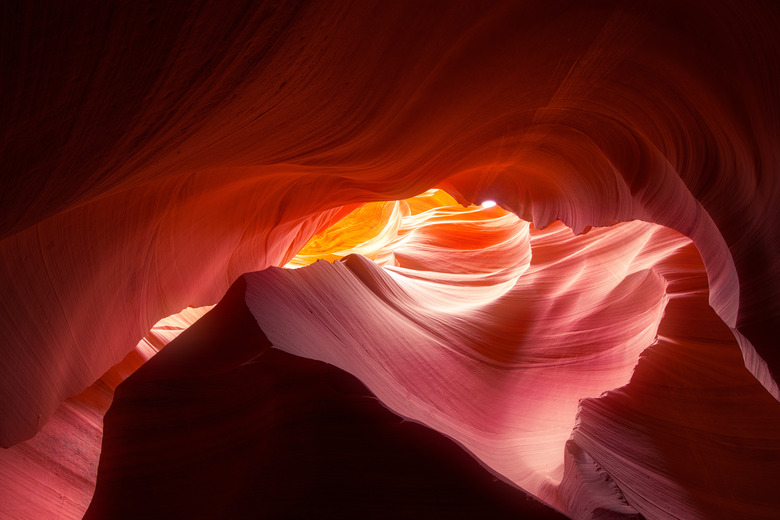What Factors Determine The Rate Of Weathering?
Weathering is the process that causes the breakdown of rocks on the surface of the earth. There are many factors that affect the rate of weathering, and they can be sorted roughly into two types: physical weathering and chemical weathering. Generally, interactions with air, water and living organisms cause the weathering of rocks. Although there are two major types of weathering processes, physical weathering and chemical weathering cannot be separated, and they often work together at different rates to break large rocks into smaller pieces over time.
Factors Affecting Physical Weathering
Factors Affecting Physical Weathering
Physical factors that affect the rate of weathering include natural zones of weakness in rocks – like fractures, joints and plate tectonics – and the layers between sedimentary rocks (called bedding planes). These vulnerable points in rocks can allow for cracking, splitting, prying and peeling away of layers or fragments of rocks.
Cracks and joints can fill with water and freeze in cold temperatures, and when water freezes, it expands. This physical change in the water can cause the weathering of rocks, resulting in pieces shearing or falling off as the frozen water pushes cracks further apart.
Similarly, tree roots may take hold in rock crevices where organic matter accumulates. The growth of these roots may cause enough physical force to enlarge the cracks. In much the same way, minerals may form solid crystals in joints, prying rocks open.
Some rocks may shed sheets of material like the layers of an onion, a physical process known as unloading. Hot and cold cycles, caused by the seasons or by unusual events like lightning or forest fires, can also cause the physical weathering of rocks.
Factors Affecting Chemical Weathering
Factors Affecting Chemical Weathering
Among factors that affect the rate of weathering, chemical processes – as a result of the combination of minerals with water, oxygen and carbon dioxide – can cause the breakdown of rocks. Sometimes rocks are dissolved over time as a result of chemical weathering.
Certain types of rocks are more vulnerable to chemical weathering, while others are more stable. Calcite is a type of rock that weathers quickly, due to the fact that it is rich in calcium. Rocks containing iron and magnesium also tend to weather rapidly, while quartz is a stable type of rock.
Biological interactions with bacteria and other organisms can increase the rate of chemical weathering. Chemical weathering can also help physical weathering by weakening the composition of rocks. This synergistic relationship works in the other direction too, as physical weathering can augment chemical weathering by creating smaller chunks of rocks and increasing the surface area available for chemical reactions.
Human Impacts on Weathering
Human Impacts on Weathering
Weathering is a natural phenomenon that is part of the carbon cycle of the planet. Ultimately, physical and chemical weathering lead to the production of soil, a process that takes millions of years. Soil is essential for all life on earth, as it provides water and nutrients to plants, which are at the lowest level of all food chains on the planet.
However, human activities can and do accelerate the rate of weathering. Human activities like agriculture and construction can accelerate weathering and lead to erosion and flooding by breaking rocks and soils up, increasing the surface area of the ground that is vulnerable to weathering.
Burning fossil fuels also increases the rate of weathering by adding carbon dioxide to the atmosphere. Carbon dioxide combines with water in the atmosphere, resulting in a weak acid called carbonic acid. When carbonic acid is released from the sky through precipitation, a chemical reaction occurs with rocks. Acid rain, a term for any precipitation that is acidic, not only accelerates the chemical weathering of rocks but also has harmful effects on plants and animals.
Cite This Article
MLA
Sloane, Christina. "What Factors Determine The Rate Of Weathering?" sciencing.com, https://www.sciencing.com/factors-determine-rate-weathering-6953035/. 30 September 2021.
APA
Sloane, Christina. (2021, September 30). What Factors Determine The Rate Of Weathering?. sciencing.com. Retrieved from https://www.sciencing.com/factors-determine-rate-weathering-6953035/
Chicago
Sloane, Christina. What Factors Determine The Rate Of Weathering? last modified August 30, 2022. https://www.sciencing.com/factors-determine-rate-weathering-6953035/
